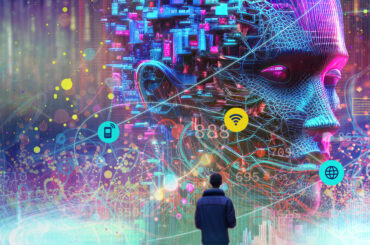For organizations globally, experience matters, be it the employees, customers, suppliers, partners, and the business itself. In the digital world, an exceptional experience will create technology stickiness, while also potentially reshaping the relationship between constituents.
With great experience, an individual, regardless of the role within an organization, will look at it positively and is usually not opposed to continuing on with it. But if the experience is negative, another opportunity that is more positive will quickly overtake the negative experience, shifting away from a potential business decision to another that is more appealing. This results in lost revenue, profitability, and/or future growth for additional products and services.
Individuals cement relationships based on the experience they have with others. Sometimes relationships are forged immediately and other times, they take time. Regardless, relationships have been at the heart of businesses for years. Robin Sharma, an author and speaker says it well, “the business of business is relationships; the business of life is human connection.”
Human Experience in the Digital World
The IDC FutureScape: Worldwide Intelligent ERP 2024 Predictions, finds by mid-2024 30% of global organizations will take advantage of humanlike interfaces in their enterprise applications to gain more insights quickly, improving decision velocity.
At the heart of this prediction is the use of Generative AI (GenAI) and its ability to elevate the user experience to a new digital level. If an individual no longer must search through data, spreadsheets, reports, and across enterprise applications to find information and can interact with technology differently, it changes the experience.
A digital world experience means instead of searching through many data sets, an individual can interact with the technology in a conversational form, by inputting text, or interacting with a chatbot or digital assistance. This information can be surfaced in a matter of moments creating a likely positive experience. This aspect requires the large language models (LLMs) that generate a human like recommendation based on the sets of data the system has been trained on.
With a multitude of data that can be tied to the systems overall, the individual will discover a wealth of information that delivers more insights, opportunities to weigh different points and elements against each other, and thoughtful considerations for better decisions. These information interactions mimic exchanges of helpful information between individuals, enabling faster and more decisive actions. Individual and organizational productivity gains are initially massive and then enable both to start to see the power of technology enabling a better experience while also improving overall performance. And it creates a positive experience and an opportunity to recreate this methodology for the next interaction. From a technology point of view it creates more stickiness of the applications and data.
Experience Creates Differentiating Value and Relationships
Using a mobile phone or tablet, one has a different experience with the technology than they do with their enterprise software. An individual can talk or type what it needs with the mobile devices and they provide answers. While not always correct and in some cases needing more clarification, it is quicker than using enterprise software applications. The mobile devices represent technology platforms with a multitude of cloud software enabled by a common design, even though the software is all different. The value is clear in the use of the software on the devices and its incorporation into ones life.
But with current enterprise software, mostly on-premise and legacy, the experience is less than stellar and doesn’t even begin to mirror the mobile experience. Automation of simple tasks is typically lacking, importing/exporting of data and sharing it is done in a plethora of applications, and integrating the workflows and data to enable a decision point can take time.
In the digital world of on-demand experience and answers, most enterprise software falls short. Unfortunately finding the information is dependent upon the individual organization and its technology stack, as well as preference for particular technologies. The value derived is not only a bad experience but also one fraught with creating a better solution than the currently used technology solution. This only leads to devaluing the current technology and moving the value to the employee that can navigate to the right solution the fastest.
In this way the experience is a competition of legacy technology savviness to meet performance requirements. With so many organizations still in the modernization stage with their enterprise software, the struggle towards a better experience and a better value for their employees overall continues to be unattainable.
Innovation Creates and Reshapes the Experience
In the absence of personal relationships in the digital world, experience is a replacement to help foster a better relationship with an organization, employee, customer, supplier and partner. The better the experience, the more replication of the process and usage of the enterprise software. In a nutshell the experience is positive and the usage will continue to grow.
Shaping the experience in the enterprise software world is GenAI which improves the business by streamlining operations through the automation of business tasks. Typically workflows are long and cumbersome and don’t work from one line of business application to another nor are tasks the same for mirror types of processes such as ordering and buying. This itself makes it hard for the organization to interact with each part of the business and come together to solve a business problem.
GenAI can help streamline long tasks by learning the workflows and data that impact it, and reshaping it to a shorter workstream. Once this is done some of the previous processes go away or become autonomous because they have been consumed into the workflow already. So, for instance, if I need to call customer service I might wait in a queue for awhile – to the point where they need to call me back and it could be a few days. But if I use the enterprise software that I ordered through, I can ask the question and a bot or agent will come up with several recommendations for me. In this way, the system has been trained and can help me immediately. When it can’t, a ‘live’ person will come on and will work with me to solve my issue. This person will have all information in front of them and can come back to me with more information to solve my issue. Innovation is creating a new experience for both me and the operator.
Experience Matters
Organizations are finding experience improves productivity and metrics, from financial metrics to customer satisfaction scores, asset maintenance and production run time, employee knowledge and well-being, and brings a reduction in non-value add tasks than can be quickly automated. As organizations mature in their usage of more experience-orchestrated business applications, they will find more shared value powered by intelligence. At the heart of the business is experience. The experience is reshaping the usage of enterprise applications and pushing the enterprise application vendors and their ecosystem of partners to bring more value to the organization.
The questions to ask are few but critical: How will this new digitally intelligent experience reshape your organization? Do you have the right technology and services team in your business helping you unleash the heart and pulse of your organization so it can run a digitally intelligent business?
If not, rethinking your strategy is critical to your survival in the digital world. IDC finds those organizations that cannot unleash the power of experience with innovative technologies like AI, will be responding to disruptions and making decisions much slower than their counterparts. Those that rely on intelligent technologies to create a better experience and operate at a much faster decision velocity will gain competitive advantage quickly and in what seems like an instantaneous moment.




